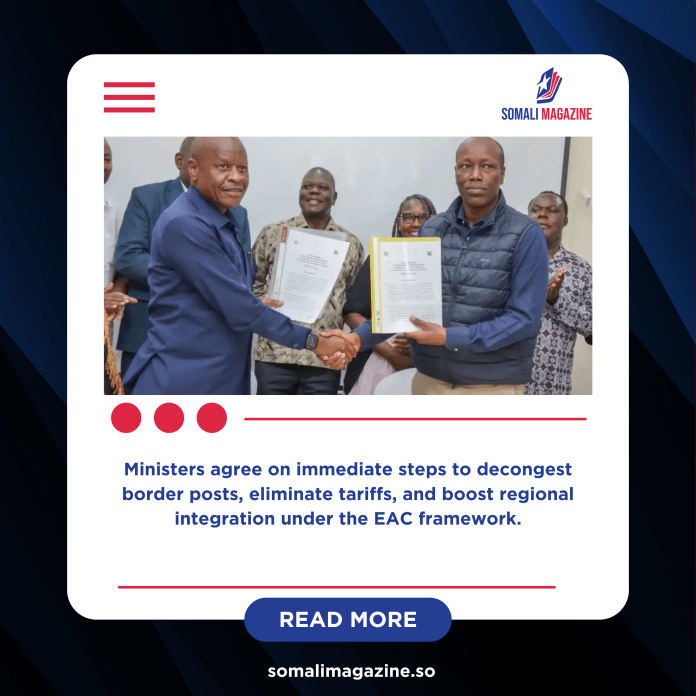Facebook Twitter (X) Instagram Somali Magazine - People's Magazine
Kenya and Uganda have taken a major step toward resolving long-standing trade challenges between the two countries. On Friday, Kenya’s Trade Minister Lee Kinyanjui met his Ugandan counterpart Wilson Mbasu in Mbale, Eastern Uganda, where they agreed on a series of measures to improve cross-border trade and align fully with the East African Community (EAC) Treaty.
The meeting was a follow-up to recent discussions between President William Ruto of Kenya and President Yoweri Museveni of Uganda during their bilateral talks in Nairobi in late July. The two leaders had directed their trade ministers to urgently address existing trade barriers and find solutions that would make business between the two neighbors smoother and more predictable.
One of the main issues raised was congestion at key crossing points between the two countries. The ministers noted that complaints from traders and transporters had become too frequent, especially at Malaba, Busia, Suam, and Lwakhakha border posts. To deal with the problem, the ministers directed all relevant border agencies to clear the backlog of trucks and cargo within 24 hours. They further instructed that congestion at the borders should never again exceed four kilometers.
Kinyanjui emphasized that the situation had become unacceptable for businesses. “It is a serious concern to receive numerous complaints affecting trade at the border points. We are committed to restoring normalcy,” he said. Minister Mbasu agreed, stressing that the governments would carry out on-the-spot inspections of the One-Stop Border Posts (OSBPs). These posts are designed to simplify clearance by having both countries’ officials in one place, but many traders have complained that they are not functioning as intended. “Facilitating the free movement of goods, services, and people is critical. Follow-up inspections will confirm whether these posts are working as expected under the EAC framework,” Mbasu explained.

Another key decision was the commitment to eliminate Non-Tariff Barriers (NTBs) that continue to disrupt trade between Kenya and Uganda. NTBs include measures such as unnecessary customs checks, import restrictions, or administrative fees that increase costs for traders. Both ministers agreed to immediately remove any tariffs, discriminatory excise duties, levies, and other charges that go against the EAC Treaty. They also promised to implement all trade-related obligations under regional protocols without delay. By doing so, Kenya and Uganda hope to create a level playing field for traders and investors from both sides. This move is also expected to send a positive signal to the wider East African business community, which has often complained about frequent disputes and restrictions between member states despite the promise of a common market.
The ministers also ordered border management agencies to operate around the clock to avoid unnecessary delays. They noted that multiple checkpoints along transport corridors were causing serious inefficiencies, and called for immediate action to reduce them. According to the joint communiqué, these measures are aimed at cutting down waiting times, lowering transport costs, and ensuring goods and people can move freely. The ministers stressed that this was not just about trade, but also about strengthening regional integration and supporting communities that depend on cross-border business.
The decisions made in Mbale reflect a renewed effort by both governments to honor their commitments under the EAC Treaty. By aligning their policies, removing trade barriers, and improving infrastructure at the border, Kenya and Uganda hope to strengthen their economic partnership and boost the regional integration agenda. The communiqué signed by both ministers concluded that follow-up mechanisms would be put in place to ensure all directives are implemented quickly. The two sides expressed optimism that with political goodwill from their presidents and cooperation among agencies, cross-border trade will become smoother and more beneficial for citizens on both sides.
For traders and transporters who have long faced delays, extra costs, and uncertainty, these commitments—if fully enforced—could mark the beginning of a new era in Kenya-Uganda trade relations.

